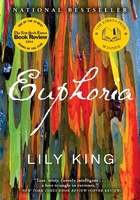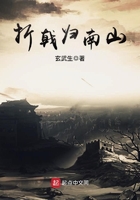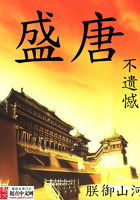I surfaced – probably from sleep though I couldn't be sure at the time – at about a quarter to six. It was still dark outside and cold. I looked out. Strange! There were robed people about, some in boats, some on the bank but no one was moving. The water was so flat that the current was not visible. The stillness of the scene was such that the figures of robed men seemed to brood as if contemplating some inevitable and awful tragedy before which movement and noise were useless and irrelevant. Had they, I asked myself, sat, crouched, leaned or stood thus all night? Were they – were we since the night had left me diminished – like lizards, which require the sun's warmth before their muscles can operate? I watched them as the dawn lightened swiftly and the faintest trace of mist drew away from the water. A fisherman was crouched in his rowing boat, his ridiculous oars (two unshaped baulks of timber) lying idle along the thwarts, his head closely wrapped against the chill of dawn. He was moored only ten yards from us. He never moved, wrapped elaborately in a thick galabia. It was as if the night was a time for grief from which men had to recover daily.
The east lightened all at once. A woman crept out of a house with a tin water vessel on her head. She came slowly down the mud bank and the tin flashed as the first grain of the sun struck it. The fisherman lifted his head. Figures began to move on the bank. It was theatrical in that it led from the first tableau of grief to the common preoccupations of day in two minutes flat. A woman led a donkey. The fisherman shipped his ridiculous oars and rowed slow strokes. Two men spread their robes and squatted by the water. The rising sun grabbed the hill of straw and at once turned it to the gold woven for the girl in the fairy story. The pigeons started to peck, the rats to rustle. A big sailing boat, her torn sails wrinkled like ancient skin, came with a just perceptible movement as the current brought her towards us. She was empty, going north. A smaller boat stood south towards us but did little more than stem the current. She was loaded deep with raw, red brick and seemed to have no more than six inches of freeboard.
Alaa appeared, blinking. I asked him what the sailing boats were called. He did not know but put the question to Reis Shasli, who was climbing aboard at that moment.
'He says they are called "Sandals".'
Reis Shasli was bowing sinuously and smiling.
'Please tell him I hope we get further today than we did yesterday.'
Alaa translated. Shasli continued to writhe, answered, then swung himself up into the glass box which housed our wheel. Alaa translated. I could not believe what I heard.
'What?'
'"He who rides the sea of the Nile must have sails woven of patience.'''
I was speechless. The philosopher of the Nile started our engine and we moved off. Alaa went below again. The ancient Nubian, who I had thought to be an employee of the yacht club at Ma'adi, appeared and began slowly to coil ropes. '… English go their way … with their habit of looking "through" persons….' I went and stood next to him feeling that even if I had no control over events at least I could do a violence to my own reserve and get to know this crew. The Nubian turned his back and went below.
We were not moving very fast. Nor could the scenery be said to be exotic or even interesting. It consisted of two river banks, each of mud. To our left the heights of the Eastern Desert were just visible.
I began to realize yet another miscalculation. In a big tourist boat you may see over the banks. But from near water level, where we were, and with the Nile at its lowest in February there was nothing to be seen but the two faces of the banks themselves. You could not in these circumstances move up the Nile examining the width of the valley but see only the severely restricted life of the water and the waterfront. More than that; the Nile in common with all rivers which flood has for countless years deposited silt on either bank, more silt near the channel than anywhere else so that the banks are raised, which of course is why they are called 'levees'. Not only was our view restricted by the mud banks, the land beyond them was lower than we were so that our normal view was of the tops of palm and nothing else. For a while it put me in a panic, the thought of sliding all the way up the Nile, hundreds of miles, in a confined and muddy ditch.
The cook, Rushdie, appeared and said that supper was ready. I explained that he meant breakfast, and went below. Ann had used our heads and was looking sick. I did what I could to remedy matters. Let that story remain untold except to say that during our trip the crew got the heads working adequately but no more.
After breakfast we wrapped up, for the northerly wind pursuing us was faster than our speed and cold, and went to sit it out on the upper deck. The Nubian was standing by the rail, holding it for support. This was not seasickness but age. I asked him his name. He muttered that he was called 'Sa?d' but seemed to resent giving the information. We were approaching an island, it appeared, for the river here divided. There were whole plantations of palms and enclosures of heavy wire netting as though the place was a prison. I asked the old man what the island was called.
'Fisher.'
'Fisher? Fisherman? Fisherman's Island?'
'Fisher. Englishman.'
'English fisherman?'
His Arabic became voluble and, I thought, resentful. When he had said his say he went below.
If we were confined to the river the least I could do was find out what I could, make what deductions I could. There were sizable palms and tamarisks growing in the levee and what looked like a few acacias. Well – for sure the acacia is an Egyptian tree! It turns up in the ancient literature time and again. Some of these trees were no more than four or five feet above the present water level. Yet before the building of the high dam at Aswan the flood had sometimes risen many feet higher than that. Even down here within fifty miles of Cairo it would have drowned these trees. They had rooted during the last fifteen years, then, and here the permitted rise of the river could be no more than four or five feet.
Alaa appeared.
'How high does the river rise in these parts nowadays?'
'Oh,' said he, 'not more than four or five feet. In February – now that is – they only let enough water through the high dam to keep the hydroelectrics working. Nobody gets any irrigation water in February. That's why the Nile is so low. It's why Shasli is going zigzag. He has to keep in the deep channel and even then there's only just enough water.'
'At least there'll be little current against us.'
'On the contrary. Shasli says that when the Nile is low all the water is in the deep channel so it runs faster.'
'When will they raise the level?'
'In a few days' time, February the sixteenth or thereabouts, Shasli says. What happens is this. They shut the first barrage down by the sea and wait until that bit of the river has risen behind it. Then they shut the barrages one after the other, all the way up the river, waiting for each section to rise. After that they begin to let water out of the main channel for irrigation.'
'Then there won't be any current at all.'
'Hardly any, he says.'
So much for planning, I thought. My idea of going up the Nile against a slight current and coming down with a fast one was exactly wrong. We should go up against a fast current in the deep channel and come down a broad river with no current to help us.
I watched the banks, apparently inching past.
'Alaa, what about those eleven knots we're supposed to be capable of? We're only using five of them.'
'There has', said Alaa gently, 'been a little bit of trouble.'
'Oh God.'
'It's the water pump. Akhmet the engineer thinks there's something wrong with it.'
I opened my mouth and shut it again. There was, I thought, probably some flowery Egyptian proverb on the tip of Alaa's tongue and I did not want to hear it. The old Nubian, Sa?d, crept out of the main cabin, crept forward and disappeared behind the bulk of the wheelhouse.
'Why is Sa?d so sulky?'
'It's a delicate matter.'
'Come on, come on!'
'Well. He was down in the Suez area, oh forty years ago. He worked for the English. He hates them.'
I thought back then, more than forty years. A world clawing itself to death: the Atlantic; storm; a helmsman, his neck broken by a single wave; D-Day.
'So that's why he knows a few words of English.'
'That's why.'
I remembered.
'He said something about this island we're passing being "Fisherman", or "English".'
'Oh, yes.'
'Tell me, then.'
'You really want to know?'
'Of course.'
'It was years ago. There was an Egyptian owned half the island. Some high-class tourists came up the river in their own boat like you – like us. One was called Fisher. He wanted to buy the island. The Egyptian invited him to a meal but the Englishman wouldn't come.'
'Why not?'
Alaa was betrayed into a high, very Egyptian laugh.
'I suppose he thought the native was dirty.'
There was no possible reply to that. Presently Alaa went on.
'However. The Egyptian gave Fisher half of the island as a guest gift.'
'But what on earth …'
'He persuaded the owners of the other half to sell it to the Englishman cheaply.'
'I don't see …'
'Egyptians are very hospitable. They offer the guest what they have.'
'Like the Arab and his horse.'
'That's why it's called Fisher's Island. Of course, after the revolution Nasser nationalized it.'
I reminded myself never in any circumstances to admire anything. I also came at once to certain defined but private opinions over the matter of Fisher and the Egyptian. The Egyptian was a dislikable fool. Fisher was just dislikable.
It was a pity about Sa?d, though.
'I don't suppose the Fisher story has lost anything in the telling.'
'Sa?d heard it from Fisher's daughter.'
The wind seemed colder, the boat slower, the banks even less interesting. Those ancient Egyptians, what would they have made of the stranger in their midst? But they were fading from my mind, had been obscured on our first visit by the lively crowds of brown men so unlike the hieratic, sideways-standing figures of my childhood. And now the truth of it, the likes and dislikes, hatreds and hysterias, the ingrained, sullen memories, the old man, lifted from his easy job at the yacht club and made to set out with us for whatever reason, a reminder perhaps….
'Alaa.'
'Huh?'
'What do they think of us? Two old people setting off in not much comfort to do whatever it is?'
Alaa thought.
'I'll find out.'
I went below to record all this river-sorrow in my journal, but stood for a long time looking grimly out of a window, at brickstacks and the chimneys of brick kilns. A sailing boat lay waiting at each brickyard. I thought to myself that these graceful 'sandals' with their simple, elegant lines and single huge sail were going to be one of the consolations of the trip. One standing north inched past us. She was, so to speak, rigged for straw. She looked, as she receded, like a mule with paniers on either side. She was built out amidships an additional hull's breadth and the load of straw was delicate gold against the dirty white sail. The steersman, standing aft of the load of high-piled straw could see nothing ahead of him. But after all, steam gives way to sail or does so in most waters. We passed a mud bank palpably dried out in the middle of the river and lined with the seagulls that the Egyptians call 'Iraqi Geese', I don't know why.
I shook off my slight depression and set myself to look for interest. At the time, apart from the occasional river boat my interest was forced to concern itself with bricks. Well, after all, bricks are not without interest. In this part of the river I could see a preposterous collection of kiln chimneys. I counted thirty in sight at the same time. It is symptomatic of the state of Egypt that this absurd overproduction is frowned on by the government, which tries to stop it but can't. It's not that bricks in themselves are a bad thing but that there are two sorts. There is mud brick, which any peasant can make on any bit of river bank; and there is burnt red brick made from the heavy, eternally fertile red clay of the valley. There can be few things in a civilization uglier than a red brickyard. Mud brickyards are minimally less repellant. But there was only one yard of mud brick among the thirty red brickyards – long brown walls of the stuff with a single workman turning the bricks to let the wind and sun get at the other side. Here and there among the fields and date-palms were mud brick buildings. The walls of a properly built mud brick building are 'battered', that is they lean in towards each other for support, an immemorial angle. Yes, that was it! The whole of Egyptian history seems subsumed in that angle. I remembered, not successively but in a whole expansive moment, one of those decisions I had come to at home, one of those chapters in this book I had not yet written, a planned essay ready in my head and lacking only the confirmation of coming and looking at the place itself – it was a process, I had said to myself. The angle, the one I had called 'immemorial', increased from this mild slope of batter, increased to the steeper angle of a temple pylon, back through the steeper slope of stone temple walls here and there, then closed in still further to the ultimate steepness of a pyramid, where the walls collided and shut out any possibility of a roof altogether. There it all was in my head. I saw the increase in angle as an increase in weight, in domination of the country by privilege. In my head I saw the temples as heavy, brutal. They said, 'You peasants have your mud-angle, a timid thing. We gods have ours. Fall on your faces. Sacrifice!' Now here, glimpsed beyond the levees and among palms were mud bricks and mud brick houses not plainly seen yet but promising to be (when I got them in full view) confirmation of the chapter lying in my head.
However, houses nearer the levees and easily seen were red brick, staring red brick, uglier, if that were possible than the brickyards. When a brickyard reached down to the river it turned the bank into a scree of broken brick. Sandals lay alongside and were sometimes being loaded. Only in one place as far as I could see were bricks being loaded unfairly into big trucks while sandals waited, empty.
In Egypt you don't shift or load bricks with a crane. If you want to fill a sandal you do it with muscle and a sloping plank. Hodmen have a plank not sloping but strapped upright against their backs from above head level down to the waist. The plank has a projecting shelf at waist level. Bricks are loaded on this step, right up to above head height, two or even three columns side by side. So the hodman carries a section of red brick wall behind him. Loaded with these dozens of bricks, hands clasped tightly at their chests as if to prevent the rib-cage from bursting the hodmen shuffle down a bouncing plank from the scree of red into a sandal then down again into the hold. A fellah heaves the bricks off the step in a few heavy lifts. The hodman rushes back for more torture so there is a constant ant procession. They take their red, empty planks back up the plank and appear again in seconds it seems, loaded down and hands clasped, all too soon. The bank, the whole yard, the sandals, the men, all is dusty red. But where there's brick there's brass. One of the sandals had a new white mainsail. I had an eerie feeling of certainty that it was someone's dowry.
All this, appropriately enough, was a stretch of river parallel to the line of pyramids that reaches down from the level of Cairo – though because of the levee or the trees we could not see and had not seen a single pyramid. In fact, to the west of us as far as we were concerned there might have been no desert at all. The palms and occasional buildings, the raw bricks and tall chimneys might have stretched between us and some ocean or other. There was nothing beyond that bank and its greenery and brickyards but sky. To the east things had been a little different. The Eastern Desert was there and now and then with some sand hump beyond the levee you were reminded of it. The high escarpment of desert rock which had withdrawn from the river after Tura and its quarry now showed signs of approaching us again. For that is the odd thing about the desert confines of the Nile Valley. It seems rather as if you yourself do not move but that the desert sneaks nearer, furtively, and looks over trees or houses then goes away again. You begin to give it character, that cloudless, brown, yellow-ochreish escarpment with sand shuffled up round its feet. You cannot define that phenomenon, only describe it crudely. But once seen, you remain aware of it and you watch out.
Then after we had dragged for hours upstream we came to open country with strangely less levee. We could see for a mile or two on either side of the river – on the left looking out to that Eastern Desert, which came sweeping in closer as if to ride over and blot out everything. There was a rim of life along the edge of the river but perilously thin. Women squatted in clusters by the water's edge with the desert hanging over them and only held back it seemed by a palm or two and here and there an ancient village wall. The women wore red or blue or black. They were not using the old balaas, the waterpot of heavy clay – so soon does everything change I never guessed that we had seen, ten years before, the end of six thousand years of the balaas! Now the women cleaned and carried pots made of metal – aluminium or tin. The pots were lighter but bigger. Clearly it didn't do to spoil women and what you save in weight of pot you can make up in weight of water. Some women – blessed champions among their sex – paced along slowly under bins large enough for trash or rainwater. Those bins were more properly to be called water butts and the sight was painful, though perhaps the women were proud of them and of carrying them. Those pots, bins, tubs and pans flashed in the sun. A procession of women, red and blue and black, all stepping with that most graceful and majestic pace are a sight lovelier than the caryatids of the Erechtheum – and as cruel. For were not the daughters of Caryas enslaved by the Athenians and set to carry burdens as a punishment? We think of all that, when we think at all of all that, as art which excuses everything.
Here and there were floating patches of what we call water hyacinth on the river. This is the plant which is busy blocking some of the great rivers of the world. It is native to equatorial Africa and to South America. Now it is to be found everywhere there is water warm enough for it. I tried a bit myself in my own water garden in the south of England, but of course the winter killed it. I saw it, I remember, spread in great fields in the river by Brisbane, Australia. In China, cannily as one might expect, they feed pigs on it. In the New World they just try unavailingly to get rid of it. Just possibly it may remain and collect metals! And now here it was, floating past, held up by its bladders but brown with the chill of winter Egypt and its winter water. The flower is pretty, of course, but the plants on the way to the sea, or at least the seaward barrage, were past that. The Egyptians, I found, call the plant Ward el Nil or Rose of the Nile. Somewhere or other I had heard the story that the plant got into the Nile from central Africa by someone using it as an ornamental plant in a water garden at Khartoum, but I don't know if that's true or not.
On this afternoon, I remember, Ann braced herself and started to sketch. She tried for a village on the east bank but it got away. However, in what for this boat was rapid succession, we passed two others just like it so she was able to complete the sketch after all. It was a sketch which, being not exactly like any village, was instantly recognizable as what a Nile riverfront village is like, thus illustrating mysteries of art, geography, observation and all kinds of things. I think she tore it up.
It is symptomatic of the sameness of the Nile that I found myself struggling to find variety to put into my journal and without much success. I decided to list any stuff there was floating in the water, but there was nothing but the odd clump of the Ward el Nil. It's a fact that there's no litter in the Nile. The water at this low period of the year was soupy, grey-green with an underlying tinge of brown. I was reduced to staring into the water and reflecting on the many diseases said to lurk there. I was cautious. Out in the middle where we were – the deep-water channel – there might not be the obvious parasites of bilharzia or guinea worm or any other of the ghastly parasitic infestations, but that still left bacterial and viral diseases. That fairly innocent-looking soup might still give you polio or hepatitis if you treated it too casually. It was all very odd, I thought. Down at Cairo they hold international long-distance swimming races round the islands. Alaa had been an oarsman and said how he used to drink water out of the Nile when hot and thirsty. He was hefty and healthy. However, disease or no, the Nile is free of litter and refuse. Perhaps there's nothing to throw away.
The river broke up around more islands. I wondered frivolously to whom they had been given as tokens of Egyptian hospitality. Napoleon, now there was a man who brought a library to Egypt with him and might well know this curious virtue or alleged virtue that obtained in Arab countries. Why had he not ridden forward at the Battle of the Pyramids and pointed out to the Mamelukes that he was a stranger in their country, that he wanted the pyramids, and that therefore….
We passed moorhens swimming in line ahead. The Eastern Desert, which had been stalking us all along, now pounced in to within yards of the eastern bank. I watched a woman take advantage of western technology and fill blue plastic bags with water. She hefted them on to either flank of an ass so that they became water panniers. Like the women with their lighter metal pots, the ass got no benefit from his blue plastic panniers. They were bigger, that was all. When the woman had the bags in position she topped them up with water and directly they were topped up and slopping over, the ass turned away without an order and plodded up into the desert. I couldn't see how far he had to go but clearly enough from the map there wasn't any green stuff between him and the Red Sea. The sun was very bright and there was a cold wind.
At about 3 o'clock in the afternoon while we were still waiting for lunch the boat swerved violently. I rushed up on deck. It was clear what had happened. The linkage between the wheel and the rudder had parted. The crew, with the exception of old Sa?d, was running in circles. There was much argument. The boat, engine out of gear, was now drifting rapidly back in the direction of Cairo. What had seemed an irritating impediment to our progress upstream but no more than that, I now saw to be a considerable current. The banks – in a way familiar to all wretched rivermen – seemed to be fairly streaking past. A young man whom I had noticed vaguely before – he wore a blue tracksuit trimmed with white stars – threw the foolish grapnel overboard but it did not hold. Shasli manoeuvred with short bursts of power as the boat swung until the bows struck the mud beach of a little island. The blue tracksuit dived for the beach, took a line, made it fast and there we were with the Nile clucking gently under our bilges.
The crew gathered in the central area of the boat and discussed what to do. Alaa and Rushdie, the cook/lutanist, jumped ashore. A fellah appeared with two women, one donkey and a water buffalo. He laughed a lot, particularly at me. Now there was a crowd on the beach all talking and laughing. A smaller crowd in the central cabin was examining a length of wire rope which had parted in the middle. They were trying to tie the wire rope. I suggested that they should try splicing it but I don't think anyone understood. Indeed, they thought plainly enough what is this passenger doing poking his nose into something which only we seamen can understand? We retired to our cabin and discussed the speed with which our little expedition was getting nowhere. After a while Ann looked out of the door and returned with a fit of the giggles. She said the committee was trying to tie the steel wire rope together with blue nylon cord. It was a situation too comical for despair. It was like all those years of hapless messing about in boats, the years of making do, the animosity of inanimate objects especially when waterborne.
I went up on deck again. The village clown once more thought I was very funny. I suggested to Alaa that there was a degree of simple-mindedness to go with the clowning and he agreed, saying that the laughter wasn't all our fault! I took a snap of the crowd and Alaa took a snap of the crowd and me. It was reasonably matey but no more.
Below decks I found that the crew had cannibalized some wire rope from another bit of machinery. God only knew, I thought, what other bit of gear would prove to be inoperative for want of wire just when we needed it. But at last we got under way again. We came to more brickyards. Upper Egypt, it appears, is constructed of red clay and brickyards. One group of chimneys stood on ornamental bases, which seemed very odd. An ornament in a brickyard seems a contradiction in terms, since brickyards are of all places the rawest and most irremediably ugly. Adornment may well wait for bricks; but in their place of making they are a kind of architectural plasma undifferentiated into grace or beauty. The attempt at amelioration was wrongheaded.
A huge crane and a water tower appeared on the southern horizon. I was beginning to grasp the character of the land. You can tell a town from a village because the town has a water tower for which the water is either drawn from the river and purified or drawn straight out of the new, deep boreholes which will make such a difference to Egyptian health. So we came to Beni Suef.
Apparently this was where we were to stop. We tied up alongside a station for the river police. This sounds more impressive than it was. The place was on the slope of the levee with two shacks, some ramshackle boats and a dozen young men who were dressed in seamen's uniforms which were ragged and dirty [see plate]. They were heavily armed, however. A sentry cradled a submachine gun of some sort or other and it was nastily clean. Here, Alaa produced our trump card – a letter he had obtained from the Chief of Police in Cairo directing all river police to give us every assistance, et cetera. So we were fixed up with water and fuel, the second everywhere in short supply. It was dark now, a darkness which began at about 6 o'clock in the evening and lasted a full twelve hours. We moored at some ornamental steps, which were convenient for shopping. We went ashore with Alaa and were 'hello'd' by men and boys. Indeed, I was even asked my name by a gaggle of schoolgirls in western dress who then fled with shrieks of laughter, 'appalled at their own temerity'. Near the river there was a small public park, very neat and clean. All the roads were tree-lined. There was a social centre further on, with a theatre and a cinema. But dust was king and made a drabness in what might have been elegant. The sparse street lighting competed unsuccessfully with the darkness of early evening. There was a street of small shops and stalls. Here and there these stalls were operating by the light of acetylene flares which took me back more than half a century. It was indeed curiously like revisiting the past. For the tendency of our street lighting is to spread round. It is hoisted up by wire, or what John Betjeman called 'seasick serpents'. This gives a height to the lighted area which enhances a sort of public bleakness as if something is being revealed which had better not be shown. But these lights were low down, at head or even waist height and shuddering. They were not so much bright as flaring; and they hollowed out a comfortable warm space like a cave in which human activities could go on in the full importance of bargaining and gossiping and quarrelling without being staringly lighted into insignificance. They were a proper light for the oranges and mangoes and bananas and for the ubiquitous carriages, the calèches of the Nile Valley which clopped and creaked here and there. There were patient donkeys being ridden by large men who sat well astern and by small boys who sat amidships as it were and pretended they were riding horses. There were trucks, bicycles and a few young men on unsilenced motor bikes. The costume was, on the whole, drab western. But the place was quite uncivilized. You could walk down the road, not on the pavement, and the traffic would divide round you as if pedestrians had a right to live. So we shopped, buying towels and tangerines and bananas. The bananas weren't very big but that was because they were straight off the tree.
We found our way back to the boat in nearly complete darkness. There was music on the corniche above the boat, music on the ship's radio – or was it a tape? – Arab utility music sounded strangely familiar. And once Rushdie had got settled in, his lute began to compete. The crew chattered busily. We seemed, I thought, to have been in the boat for a month though it was no more than two days. We were sixty odd miles from Cairo. I reminded myself that we still had a meal to come before we tried to sleep – but the meal didn't come. Instead, the chattering died away, the generator stopped and slowly the lights in our cabin faded until all that was left was a faint glimmer through the starboard 'window' from the street lighting of Beni Suef.















